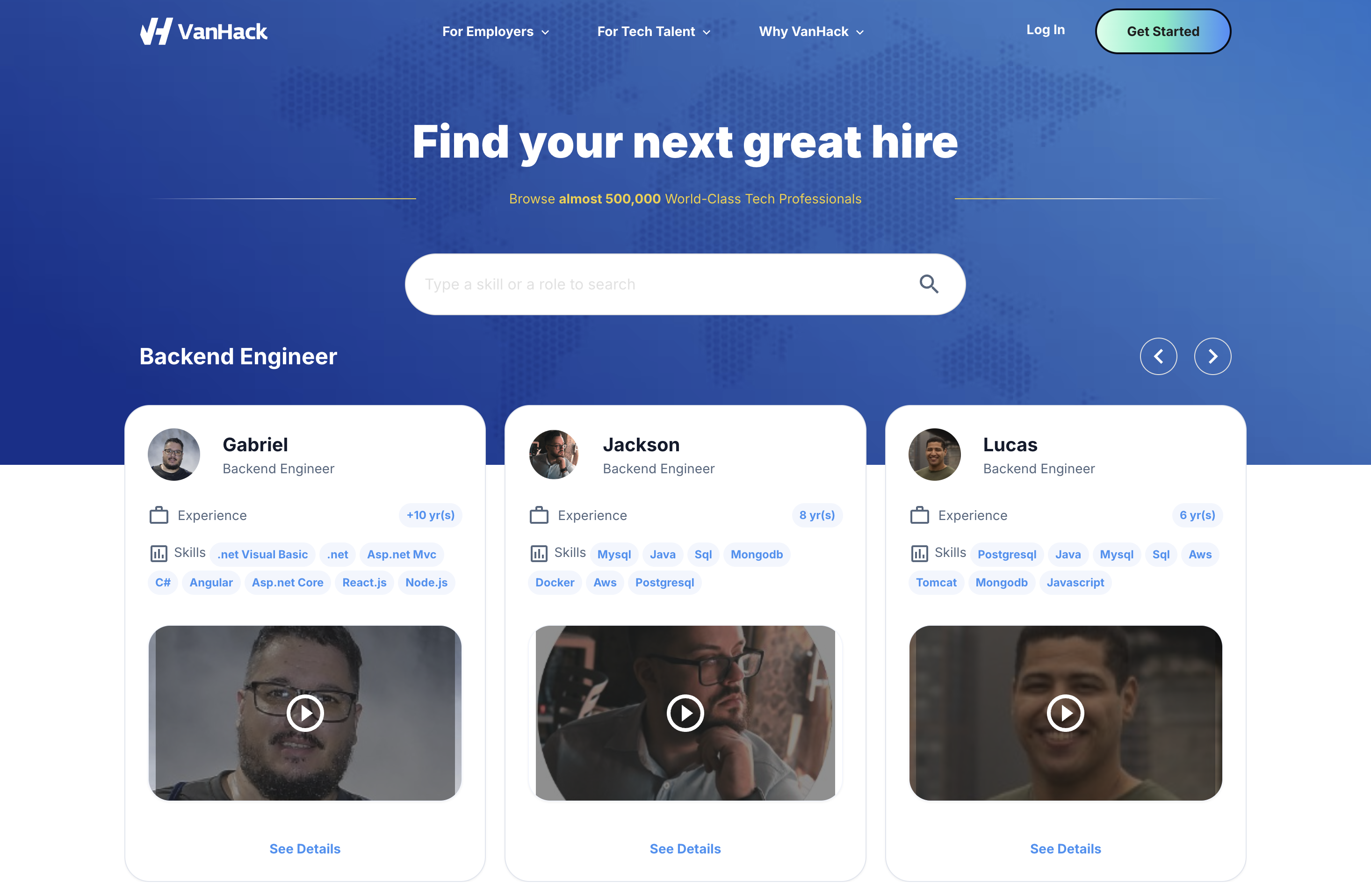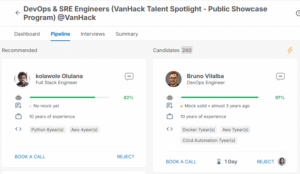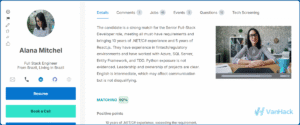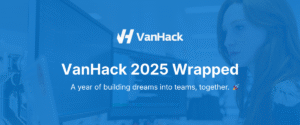Finding experienced Flask developers in the US often means high costs and fierce competition. Latin America, on the other hand, has a growing pool of talented developers who offer quality skills at more affordable rates, plus the benefit of similar time zones for remote work with US companies. This article shares 7 straightforward strategies to help you hire top remote Flask developers from the region. You’ll get clear steps to find the right people and build a strong team while saving on costs. Discover how to connect with skilled candidates quickly through VanHack’s platform.
Why Latin America Is a Smart Choice for Hiring Flask Developers
The US tech market faces a shortage of skilled professionals, especially for niche tools like Flask, a Python framework. Senior Flask developers in the US often earn over $100,000 per year. In contrast, Python developers in Latin America average about $42,000 annually, with specific figures like $41,250 in Brazil, $41,800 in Argentina, and $43,450 in Mexico.
Cost savings aren’t the only advantage. Latin America’s time zones align closely with the US, making real-time collaboration during work hours easier. Many tech professionals in countries such as Colombia, Argentina, and Costa Rica speak English well. Plus, their familiarity with North American business practices helps remote teams work together smoothly.
Some companies worry about communication issues or the complexity of hiring abroad. The steps below tackle these challenges directly, offering practical ways to access this talent pool while avoiding common obstacles.
1. Build an Employer Brand That Appeals to Remote Talent
To attract skilled Flask developers from Latin America, your company needs to stand out to a remote, global audience. Office perks like free snacks don’t matter to distributed workers. Instead, highlight what resonates with them: flexible schedules, opportunities to grow professionally, and a welcoming team culture.
Share stories that show how your company supports remote work. Feature feedback from current Latin American team members about their experiences and career growth. Focus on results rather than hours spent online, and mention tools or policies that support flexible, cross-time-zone collaboration.
Be upfront in job postings about pay ranges, remote benefits, and career paths. Developers in Latin America often research market rates, so clarity on compensation helps you compete for their attention.
You can also create content tailored to the region, like blog posts about remote team success or involvement in Latin American tech events. This shows respect for their culture and builds trust.
2. Write Clear, Detailed Job Descriptions for Flask Roles
Vague job listings won’t attract the right remote Flask developers. Be specific about skills, project goals, and how they’ll work with your team to ensure only qualified candidates apply.
List exact technical needs, such as:
- At least 5 years of experience with Flask and SQLAlchemy.
- Strong background in designing and building RESTful APIs.
- Knowledge of AWS deployment and Docker setups.
- Experience with testing tools like pytest and unit testing.
Spell out teamwork expectations, too. Mention your team’s working hours, how often meetings happen, and preferred communication methods. Clarify if they’ll need to document work or follow specific project management styles.
Transparency on pay is key. Senior Flask developers in Colombia often earn between $30,000 and $60,000 per year, with higher rates for those with global experience. Offer competitive pay within this range to attract top talent.
Highlight opportunities for growth, like working on complex projects or mentoring others. Skilled developers value challenging work and learning as much as they value salary.
3. Use Targeted Platforms to Find Qualified Candidates
General job boards like Indeed often bring too many unqualified applicants, wasting your time. For hiring remote Flask developers from Latin America, platforms that screen candidates for skills, English ability, and team fit offer better results.
Sorting through countless resumes and scheduling across time zones is tough with standard job sites. Specialized platforms cut through this by pre-vetting applicants, focusing on technical tests, language skills, and cultural alignment.
VanHack stands out with its AI tool, “Vanna,” which scans over 500,000 pre-screened candidates to match you with a shortlist of 3-5 strong Flask developers. This saves hours compared to sifting through applications manually. Explore how to connect with skilled talent using VanHack’s focused approach.

When choosing a platform, check their screening process, the quality of their talent pool, and their track record. Look for detailed profiles with test scores, work samples, and experience summaries to make hiring decisions faster.
4. Set Up Thorough Vetting for Skills and Team Fit
Hiring remote developers means looking beyond resumes. For Flask roles, assess both technical know-how and the ability to collaborate effectively from afar.
Begin with short video intros to gauge English skills and communication style. A quick 90-second clip can show more about a candidate’s clarity and confidence than written exchanges.
Use tools like HackerRank for technical tests. These evaluate real-world Flask skills, such as creating APIs, working with SQLAlchemy, managing security features, or improving app speed. Keep scoring consistent to compare candidates fairly.
Consider AI-based technical interviews for deeper insights. These allow candidates to solve problems and explain their reasoning on their own time, revealing how they think and code.
VanHack’s platform pulls together video intros, AI interview results, and coding test scores. This centralized data helps managers assess skills quickly without multiple early calls, respecting everyone’s time.
Don’t skip team fit. Look into candidates’ experience with remote setups, independent work, and cross-cultural teams. Ask about past remote roles, how they manage time, and how they stay connected with distant colleagues.
5. Create a Smooth Onboarding Process for Remote Hires
Bringing remote Flask developers on board successfully takes a clear plan, especially when working across countries. Weak onboarding can lead to early struggles with culture or communication.
Prepare detailed guides on coding standards, workflows, and team communication. Include rules for testing, deployment, and project tracking. Good documentation lets new hires learn independently and reduces the need for constant check-ins.
Pair new developers with mentors who understand cross-time-zone work and cultural differences. Set up regular one-on-one talks to help them solve problems and feel part of the team.
Plan check-ins for the first 90 days, with weekly reviews and feedback. This balances support with independence, helping new hires adjust without feeling overwhelmed.
Build team connection through virtual activities, like casual chats or shared coding sessions. These efforts help create bonds despite physical distance.
Use tools that support remote work, such as Slack for messaging, Notion for notes, GitHub for code, and Loom for quick videos. Make sure everyone knows how to use them and follows communication norms.
6. Handle Cross-Border Hiring Rules and Logistics
Hiring internationally comes with legal, financial, and paperwork challenges that can catch US companies off guard. Getting a handle on these early avoids expensive errors and keeps employment compliant.
Look into labor laws for each Latin American country you’re targeting. Brazil has specific contract and benefit rules. Argentina requires strict steps for ending contracts and pays mandatory bonuses. Mexico includes profit-sharing for some workers. Knowing these shapes your contracts and budget.
For companies not setting up local offices, Employer of Record (EOR) services can manage payroll, taxes, benefits, and legal rules. This lets you focus on managing the developer while staying compliant.
Sort out payment details upfront. International transfers and currency issues can delay salaries. Tools like Wise or Payoneer often work better than standard bank transfers for consistent pay.
If relocation is an option, visa processes and family logistics add extra steps. These require expert help and plenty of planning time.
VanHack simplifies this with global mobility support. Their in-house team manages immigration, visas, and relocation needs like housing or schools, easing the burden for companies new to international hiring.
7. Design Fair, Market-Based Pay and Benefits
Offering the right compensation for Latin American Flask developers means matching local market rates while staying within budget. A well-thought-out package helps you hire and keep skilled professionals.
Python developers in Latin America earn around $42,000 per year on average, with differences by country and experience. Brazil averages $41,250, Argentina $41,800, and Mexico $43,450. Senior Flask developers in Colombia range from $30,000 to $60,000 annually, with higher pay for those with international projects.
Set base pay within these ranges, but think about the full package. Health coverage, learning budgets, equipment support, and flexible time off can mean more than a slightly higher salary. Many developers in the region prioritize growth and career paths.
Add bonuses for specific achievements, like finishing projects, leading tech tasks, or guiding teammates. These rewards tie personal goals to company success.
Support remote work with stipends for laptops, internet, or home office setups. This shows you’re invested in their productivity and comfort.
Fund learning opportunities, like courses, certifications, or tech conferences. Developers often value skill-building as much as pay, and it helps keep them with your team longer.
Be open about how pay can grow over time. Define promotion steps, salary levels for different roles, and any equity options. Clear paths encourage developers to stay committed.
Frequently Asked Questions (FAQ)
What Salary Can I Expect to Pay a Senior Flask Developer in Latin America?
In 2025, senior Flask developers in Latin America typically earn between $30,000 and $60,000 per year, with an average near $42,000 for mid-to-senior roles. Pay depends on location, experience, and skills. For instance, in Colombia, salaries range from $30,000 to $60,000, while Brazil, Argentina, and Mexico average between $41,250 and $43,450. Higher rates often apply to those with advanced skills in areas like API design, strong English, or leadership experience. Remote roles for international companies tend to offer above local averages.
How Can My Company Communicate Well with Remote Flask Developers in Latin America?
Good communication with remote developers starts with hiring those who speak English clearly, often verified through video intros. Set up defined ways to share updates without needing constant live meetings, use tools for visual collaboration, and encourage an open team environment. VanHack screens candidates for language skills to help them fit into your team. Lay out standards for written updates, regular video calls for connection, and tools like Slack for daily chats. Many developers in Latin America are fluent in English, especially those used to global clients. Clear guidelines on response times and communication channels prevent misunderstandings and build trust.
What Makes Hiring Remote Flask Developers from Latin America Better Than Other Regions?
Latin America provides a mix of skilled developers, reasonable pay rates, good English levels, and time zones close to the US. This setup makes live collaboration easier than with farther regions, offering a practical nearshore choice for US firms needing Flask experts. Cultural similarities with North American work styles ease team blending. Countries like Argentina, Brazil, and Colombia have strong tech education, producing developers familiar with current tools and methods. Cost savings are significant without losing quality, as many developers there are experienced with global standards and clients.
Does VanHack Support Legal and Immigration Needs for Relocating a Flask Developer?
Yes, VanHack offers full support for relocation and global mobility. Their dedicated team handles immigration steps, including visa processing with a consultant, and helps with practical needs like housing, flights, and schools. This assistance makes the transition smoother for developers and their families, helping companies without internal expertise manage global hiring.
Conclusion: Build Your Flask Team with VanHack’s Help
Using these seven steps can change how you hire remote Flask developers from Latin America. Each approach works on its own, but partnering with experts in international tech hiring can make the process even easier.
Relying only on US talent for senior Flask roles limits your options. High salaries, local shortages, and competition create barriers for growing companies. Tapping into Latin America’s developer community lets you access skilled professionals, control costs, and create diverse teams.
VanHack simplifies hiring remote Flask developers from Latin America. Their AI matching system, detailed vetting, and relocation support remove common hurdles in global hiring. They guide you from finding candidates to integrating them into your team, helping you scale worldwide.
Don’t let location restrict your access to great talent. Software development is increasingly global and remote, and companies open to new hiring methods can thrive. Start building your team with VanHack’s support.
Ready to speed up hiring and connect with skilled developers? Take the first step with VanHack today.



